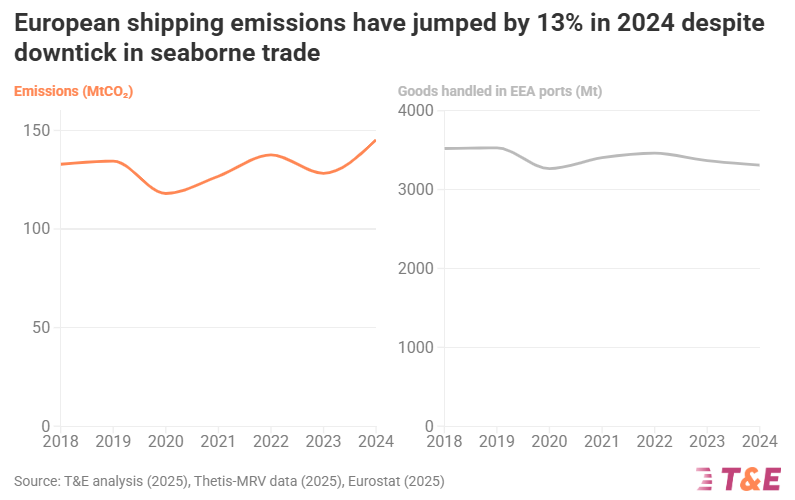European shipping emissions surged by 13% in 2024, reaching their highest levels since mandatory reporting began in 2018, according to new analysis by Transport & Environment (T&E). The increase came despite a decline in EU-related seaborne trade, with rerouted vessels avoiding the Red Sea likely contributing to longer journeys and higher emissions.
T&E’s review of official EU Monitoring, Reporting and Verification (MRV) data shows that container ships were the main drivers of the rise, recording a 46% increase in emissions. The jump is attributed to an 18% rise in average distances sailed, a 3% uptick in vessel speeds, and an expansion in the number of ships deployed to cover extended routes. Shipping emissions are highly sensitive to speed, with each 1% increase in speed resulting in a roughly 3% rise in emissions.
“Last year’s record pollution shows that even when trade declines, disruption can lead to higher emissions from ships,” said Agathe Peigney, maritime transport policy officer at T&E. “With the inadequate IMO deal being shelved, the EU carbon price has never been more crucial.”
The EU Emissions Trading System (ETS) for shipping, introduced nearly two years ago, has achieved around 99% compliance in its first year. T&E says the forthcoming review presents an opportunity to strengthen the scheme and extend carbon pricing to smaller vessels, ensuring all operators contribute fairly to decarbonisation efforts.
MSC remained the most polluting shipping company in Europe, accounting for 15.6 million tonnes of CO₂ in 2024. Grimaldi Group followed with 3.8 million tonnes, while cruise operator Carnival emitted 2.5 million tonnes.
Despite Europe’s increasing use of renewable energy, fossil fuel carriers still represent about 20% of total EU shipping emissions, a figure unchanged since 2018. Emissions from liquefied natural gas (LNG) carriers have grown since Russia’s invasion of Ukraine but showed a slight decline last year, while emissions from crude oil transport rose to their highest level since 2019.
“Transporting fossil fuels represents a double climate blow,” said Peigney. “Ending Europe’s fossil fuel dependency would eliminate a major source of emissions, but over 80% of shipping emissions would still need to be decarbonised through efficiency and green hydrogen-based fuels.”





















